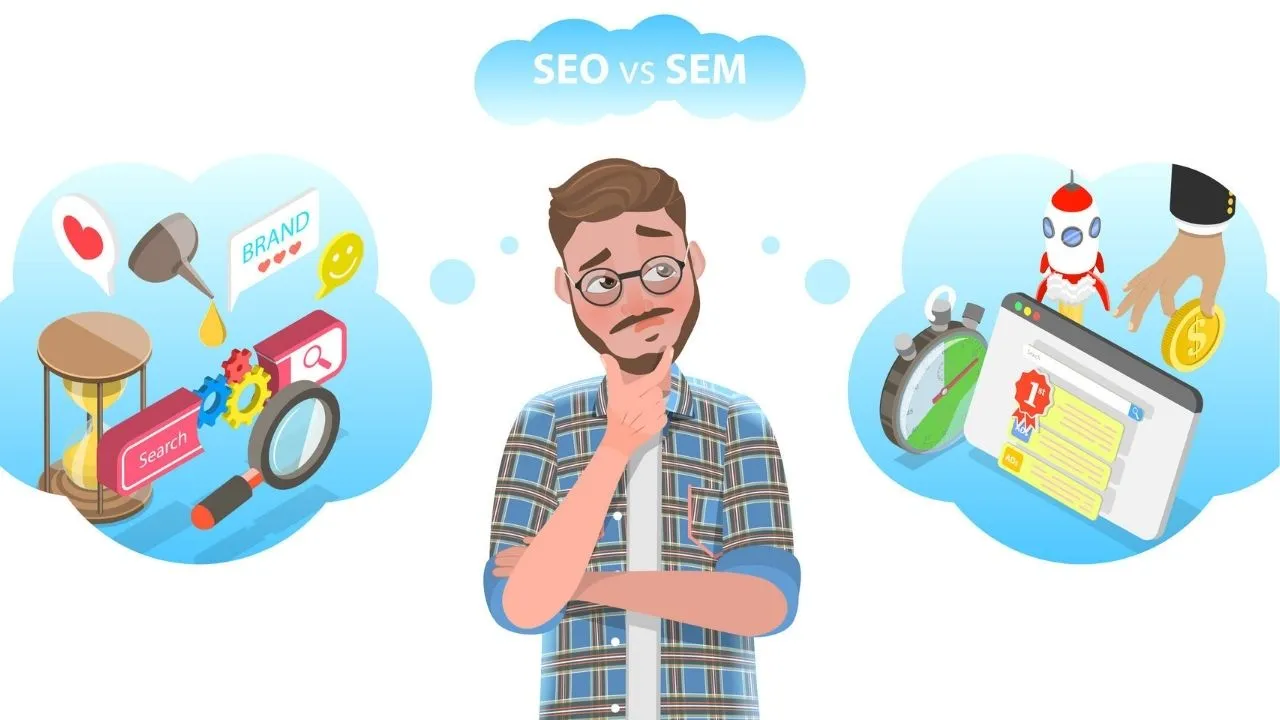
Table of Contents
In the digital marketing landscape, SEO (Search Engine Optimization) and SEM (Search Engine Marketing) are two essential strategies for enhancing online visibility and driving traffic to your website. While they share some similarities, they are fundamentally different in their approach and execution.
Understanding the differences between SEO and SEM can help you make informed decisions about your digital marketing strategy. In this article, we will explore what SEO and SEM entail, their key differences, and how to leverage both to achieve your marketing goals.
What is SEO?
1. Definition:
- SEO stands for Search Engine Optimization. It involves optimizing your website to improve its organic (non-paid) rankings on search engine results pages (SERPs).
2. Key Elements of SEO:
- Keyword Research: Identifying relevant keywords and phrases that your target audience is searching for.
- On-Page SEO: Optimizing individual web pages with keyword-rich content, meta tags, header tags, and internal links.
- Off-Page SEO: Building backlinks from reputable sites to improve your site's authority and rankings.
- Technical SEO: Ensuring your website is technically sound, including aspects like site speed, mobile-friendliness, and proper indexing.
- Content Creation: Producing high-quality, valuable content that meets user intent and attracts organic traffic.
What is SEM?
1. Definition:
- SEM stands for Search Engine Marketing. It encompasses a broader approach to gaining visibility on search engines, including both SEO and paid advertising (PPC).
2. Key Elements of SEM:
- Paid Search Advertising (PPC): Creating and managing pay-per-click ads on search engines like Google Ads. Advertisers bid on keywords, and their ads appear in the sponsored sections of search results.
- Keyword Research: Similar to SEO, identifying the right keywords to target in your paid campaigns.
- Ad Creation: Developing compelling ad copy and visuals to attract clicks and conversions.
- Landing Page Optimization: Ensuring the landing pages where users are directed after clicking on ads are optimized for conversions.
- Performance Tracking and Analytics: Monitoring ad performance and making data-driven adjustments to improve results.
Key Differences Between SEO and SEM
1. Cost:
-
SEO: Primarily involves an investment of time and resources. While there are costs associated with tools and services, the clicks you receive from organic search are free.
- SEM: Involves direct costs for paid advertising. You pay for each click (PPC) or impression your ads receive.
2. Speed of Results:
- SEO: Typically takes longer to see results, as it involves building authority and relevance over time. It’s a long-term strategy with sustainable benefits.
- SEM: Can deliver immediate results as soon as your ads go live. It’s effective for short-term goals and quick visibility.
3. Longevity and Sustainability:
- SEO: Once established, organic rankings can provide long-term, consistent traffic without ongoing costs. However, it requires continuous effort to maintain and improve rankings.
- SEM: Delivers instant traffic but stops as soon as you stop paying for ads. It's a more transient approach compared to SEO.
4. Trust and Credibility:
- SEO: Organic results are often perceived as more trustworthy by users. High organic rankings can enhance your brand's credibility.
- SEM: Paid ads are clearly marked as such, and while they can be effective, they may not carry the same level of trust as organic results.
5. Strategy and Approach:
- SEO: Focuses on long-term growth by improving your website’s overall quality and relevance to search queries.
- SEM: Combines paid advertising with SEO efforts to maximize visibility and drive traffic quickly.
Conclusion on SEO vs SEM
Both SEO and SEM are crucial for a successful digital marketing strategy. While SEO is a long-term investment in your website’s organic growth, SEM offers immediate visibility through paid advertising.
By understanding the differences and leveraging both strategies, you can achieve a balanced approach that drives both short-term gains and long-term success.
Elevate Your Online Presence with SEO and SEM!
Ready to boost your online visibility with a comprehensive SEO and SEM strategy? At Softhat IT Solutions, we specialize in creating tailored digital marketing plans that deliver results. Contact us today to learn how we can help you achieve your marketing goals.
